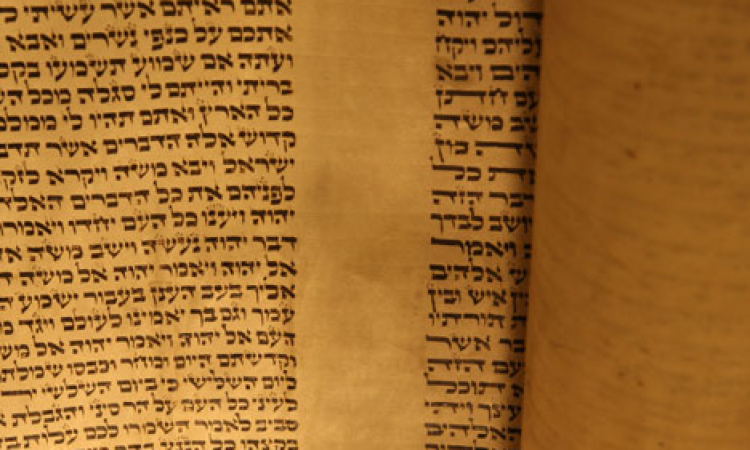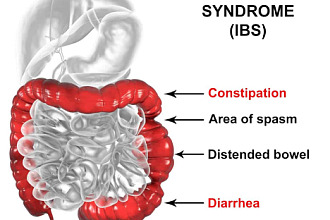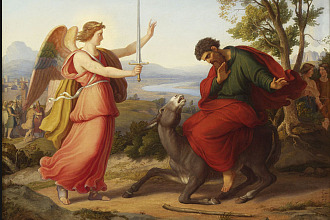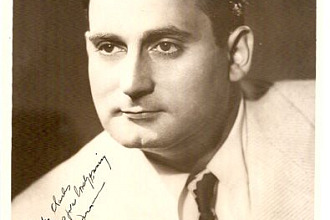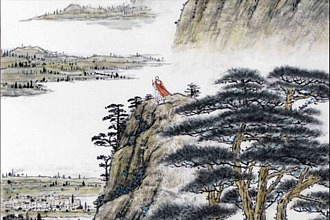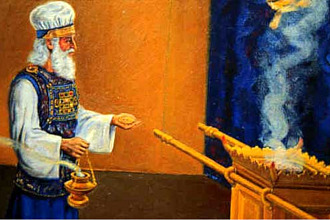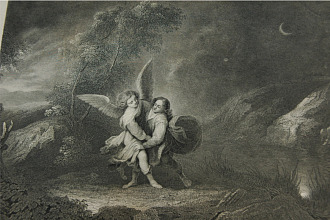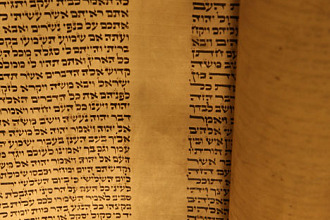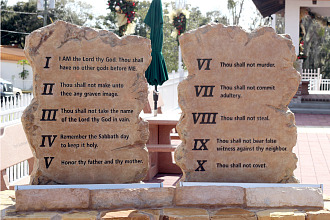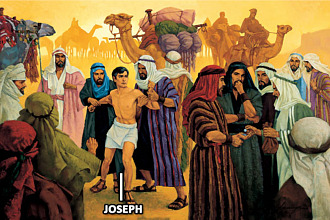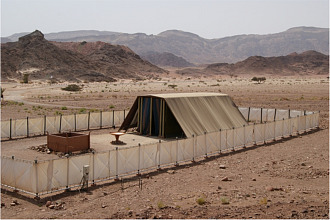Parasha for the Week: Toldot Genesis 25:19 – 28:9
Haftarah for the Week: Malachi 1:1 – 2:7
Apostolic Writings: Hebrews 12:16 - 17
Overview
After 20 years of marriage, Yitzchak’s prayers are answered and Rivka conceives twins. The pregnancy is extremely painful.
G-d reveals to Rivka that the suffering is a microcosmic prelude to the worldwide conflict that will rage between the two great nations descended from these twins.
According to the Jewish tradition Eisav represents “Rome” and ultimately the “Goyim” or “nations” and Yaakov represents Israel.
Eisav is born, and then Yaakov, holding onto Eisav’s heel. They grow and Eisav becomes a hunter, a man of the physical world, whereas Yaakov sits in the tents of Torah developing his spiritual life. On the day of their grandfather Avraham’s funeral, Yaakov is cooking lentils, the traditional mourner’s meal. Eisav rushes in, ravenous from a hard days hunting, and sells his birthright (and its concomitant spiritual responsibilities) for a bowl of lentils, demonstrating his unworthiness for the position of firstborn.
A famine strikes Canaan and Yitzchak thinks of escaping to Egypt, but G-d tells him that because he was bound as a sacrifice, he has become holy and must remain in the Holy Land. He relocates to Gerar in the land of the Philistines, where, to protect Rivka, he has to say she is his sister.
The Philistines grow jealous of Yitzchak when he becomes immensely wealthy, and Avimelech the king asks him to leave.
Yitzchak re-digs three wells dug by his father. Avimelech, seeing that Yitzchak is blessed by G-d, makes a treaty with him.
When Yitzchak senses his end approaching, he summons Eisav to give him his blessings. Rivka, acting on a prophetic command that the blessings must go to Yaakov, arranges for Yaakov to impersonate Eisav and receive the blessings.
When Eisav in frustration reveals to his father that Yaakov has bought the birthright, Yitzchak realizes that the birthright has been bestowed correctly on Yaakov and confirms the blessings he has given Yaakov.
Eisav vows to kill Yaakov, so Rivka sends Yaakov to her brother Lavan where he may find a suitable wife.
"Abraham Fathered Isaac"
The parashah starts with these words “These are the generations of Isaac, Abraham’s son: Abraham fathered Isaac,” (Genesis 25:19). Knowing that to write on parchment in the time of Moses was not easy and each word requires a special effort, we can ask the question: Why does the Torah repeats that Yitzchak was the son of Avraham and that Avraham was the father of Yitzchak? Just one affirmation would have been enough. The Jewish tradition tries to answer this question, comparing the beginning of the genealogy of Ishmael at the end of the previous parashah. It is written: “These are the generations of Ishmael, Abraham’s son, whom Hagar the Egyptian, Sarah’s servant, bore to Abraham.” (Genesis 25:12). Here it is said that Ishmael was the son of Abraham, but not repeating that Abraham was the father of Ishmael. And when we go to the genealogy of Eisav, it is not written that Eisav was the son of Yitzchak or even that Yitzchak fathered Eisav (Genesis 36:1). The answer goes that way “When one met Yitzchak and complimented him for being what he is —the Jews say a tsaddik or “righteous.” Yitzchak would modestly, respond: “I am really insignificant. The only great thing about me is that I am the son of a great father, Abraham.” And when one praised Avraham for his stature and greatness —Abraham was very much respected in his time—, he would answer: “All this is insignificant. The only important thing is that I have a son such as Yitzchak.” Thus, Yitzchak would pride himself with his father Avraham, and Avraham was proud that he had a son such as Yitzchak. That is what is reflected in this verse of the parashah.
"Yitzchak’s Wedding"
Then we have the wedding of Yitzchak: “and Yitzchak was forty years old when he married Rivkah daughter of Bethuel the Aramean from Paddan Aram and sister of Laban the Aramean.” (Gen 25:20). Although it was Abraham dearest wish and anxious concern to find for Yitzchak the right wife, and although Abraham was very old and did not know how much longer he would live, he nevertheless waited until Yitzchak was forty years old. Yitzchak character was first to strengthen and solidify, and he was to reach full independence and maturity, so that he would be capable of being a support to his wife, spiritually no less than materially.
"Rivkah and the Twins"
To understand the relationship between Isaac and Esau, as well as that of Esau and Jacob, may be found in the beginning of this Torah portion where we learn that Rivkah is pregnant and experiencing extreme, pain: “And God said to her, ‘Two nations are in your womb, and two peoples shall be separated from your bowels; and the one people shall be stronger than the other people; and the elder shall serve the younger.’” (Genesis 25:23). Rivkah alone was informed of the different destinies of her children. Apparently, Isaac was unaware of their duality, and, consequently, of their separate missions. It is interesting that both parents name the first born, while only the father names the second. In fact, nowhere in the Torah does Rebecca refer to her second son as Jacob. She always calls him “my son.” Perhaps she knows that his identity is not determined by his relationship with his brother; perhaps she realizes that he will later receive a different name from God—the name Israel. “And the boys grew; and Esau was a skillful hunter, a man of the field; Jacob was pure, living in tents.” (Genesis 25:27). From a quick look we would have thought that biblical people would prefer the man of the tent to the hunter. Why, then, are we told that Isaac prefers Esau? “Isaac loved Esau because he ate of his game, but Rivkah loved Jacob.” (Genesis 25:28). What is translated in the English King James version as “he did eat of his venison” in Hebrew is כִּי־צַ֣יִד בְּפִ֑יו ki-tsayid befiyv, meaning literally “hunting was in his mouth.” So, Isaac’s love is directly connected to Esau’s hunting—he loved the meat that Esau fed him.
It is also strange to note that this makes Isaac’s love for Esau conditional, dependent on Esau’s hunting skills, while Rebecca’s love for Jacob is described without qualifications—it is unconditional. We see here a strong parallel with God who loves us unconditionally.
HAFTARAH Malachi 1:1 – 2:7
This text make a link between this Haftarah and the Parashah for this week. In Parashah Toldot, we have the birth of Yaakov and Esav, their differences and conflicts. The prophet confirms that the covenant made with Avraham and Isaac goes to Yaakov and not to Esav: “I loved you,” says Hashem. But you say: “How have you loved us?” “Was Esav not Yaakov’s brother?” —It is the declaration of Hashem— “Yet I loved Yaakov and Esav I hated.” (Malachi 1:2–3). This verse is here again to teach us how much God loves Israel. The Jewish people are people full of sin, she has been punished by God, but this punishment is from a father who love his child. The prophet speaks as the people of Israel and asks “How have you loved us?” Israel knew that God loved the patriarchs and their ancestors, but they wanted a confirmation of His love for this generation. Hashem answers this question by a first question: “Was Esav not Yaakov’s brother?” Yes of course Esav was the brother of Yaakov, they were almost twins, but the blessings of God were more upon Yaakov and his descendants than on Esav, and God continues saying: “Yet I loved Yaakov and Esav I hated.” The text is saying how the land given to the descendants of Esav will stay a desert: “I made his hills a wasteland and gave his inheritance to jackals of the wilderness.” (1:3). The land given to Esav is the Eastern part of the Jordan River, which is until today a difficult land full of desert. Israel has always respected their brothers descendants of Esav, the Torah said to Israel: “You are not to detest an Edomite, for he is your brother.” (Deut. 23:8).
After affirming His love for Israel, Hashem says to His people that He does not see a reciprocal love. “‘A son honors his father, and a servant his master. So if I am Father, where is My honor? If I am Master, where is My reverence?’—says Hashem-Tzeva’ot—’you, kohanim who despise My Name’!” (1:6a). It seems that Israel is not honoring Hashem, her God as she should. The main reproach is made to the kohanim (the priests), they are the leaders, they are the teachers, they must teach the law of God but instead not only do they neglect to teach the people but they “despise My Name” said Hashem. However, the kohanim deny their action, and they answer to God: “But you say, “How did we despise Your Name?” (1:6b). God is answering, and said how they despise the name of God, in offering inappropriate sacrifices, in the Hebrew text it is used the term Lechem (bread) to describe the inappropriate sacrifice and Radak affirms that this Hebrew word is used in the Scripture for all kind of sacrifices (Leviticus 21:21; Numbers 28:2). Hashem asked Israel to bring to the “table of the Lord” perfect sacrifices, but they bring: “a blind one as sacrifice” and “a lame or sick one” (1:8). In fact all the text of this haftarah is against the behavior of the Kohanim.
In the chapter 2, God reminds the Cohanim that the covenant of peace was made with the tribe of Levi, through their head who was Aaron,
The Haftarah ends with advice to the Cohanim, saying how should be their teaching: “For a kohen’s lips should guard knowledge, and instruction must be sought from his mouth. For he is a messenger of Hashem-Tzva’ot.” (Malachi 2:7).
Apostolic Writings: Hebrews 12:16 - 17
The text of Hebrews in the Apostolic Writings is speaking about the text of the Parashah for this week. It is said: “Also see to it that there is no immoral or godless person—like Esau, who sold his birthright for one meal. For you know that later, when he wanted to inherit the blessing, he was rejected. He found no chance for repentance, though he begged for it with tears.” (Hebrews 12:16–17).
These words give us some light on the character of Eisav, and this light helps us to understand what happened exactly. We have heard so many wrong comments on the experience of Yaakov and Eisav. Most of the preachers or commentators are very tough with Yaakov who “cheated” his father and his brother.
However, if Yaakov went to his father to get his blessing instead of Eisav, it was first because event though his father did not know, he was now the firstborn —let’s remember that Eisav exchanged his firstborn right for a soup of lentil many years earlier, when they were 15, and it was also on the instigations of Rivkah, his mother, who heard the conversation between Yitzchak and Eisav, and knew that Yaakov was the right one. She remembered God’s instructions when she was pregnant of the twins.
Most of the time, mothers know the true character of their sons and daughters. They pass much more time with them than their fathers.
Abraham instructed Rivkah about God’s promise, the prophecies of glorious future and the gift of the land and so on. She heard him about many others promises given by God. And as we have seen in the text of Genesis, Abraham knew the Torah and its laws, “Abraham obeyed My voice, and kept My charge, My commandments, My statutes, and My laws.” (Genesis 26:5), it is not written here about a few commandments such as tithing (Genesis 14:20) or circumcising (Genesis 17:10) but all God’ laws, since the text speaks about “commandments” (Mitzvot), “statutes” (Chukim) and laws (Torotay), he kept the Shabbat, he made sacrifices, he did not commit adultery and did not kill etc… he kept the 613 commandments of the Torah but not the rabbinical laws as not to cook any meat with any milk (Genesis 18:6-8).
Rivka discovered that Yaakov was much more inclined to be like Abraham, and Yitzchak, keeping the commandments. Yaakov was 15 years old when his grand-father Abraham died, that is why we can be sure that before 15, he went to the tent of Abraham hearing and studying with him the stories of their ancestors, from the creation of Adam and Eve, to his exodus from Mesopotamia, to come to the land of Canaan in order to obey God’s order, and the Torah. He heard from his father, Yitzchak, these stories too. Rivkah observed her two boys, she discovered that Yaakov deserved the spiritual blessings.
It is revealed in the book of Hebrews that Eisav was immoral (16) it was certainly a trait of character that Rivkah saw in the personality of Eisav, it was one of the reason that she thought that preserving the spiritual heritage of Abraham and Yitzchak would be better if Yaakov would have it. He had not these immoral behavior that Eisav had with the women from Canaan.
In addition he was “godless” (16), Eisav was a man of the field, a wild man, who had no other God than himself, he did not care about the feelings of his father and mother when he married a Canaanite lady, even though he knew that would not please his parents. It is surprising to meet someone who was living about 3,700 years who had no God. In our days and with our vocabulary we would say that Eisav was an atheist. The father of atheism. He rejected God, his promises, and his inheritance rights for a meal.
Yaakov and Rivka knew exactly who was Eisav that is why they accepted to play this drama with their father and husband, Yitzchak.
The text of Hebrews tells us something more “he was rejected.” (17); Eisav was rejected, who rejected him, not his father, his father was ready to give him his main and first blessings, thus he was rejected by God who knew that Eisav could not deserve the spiritual blessings.
The text says that “He could bring about no change of mind” (17) that means nothing made him to change his mind. He was a man of the field, he did not like the teaching of his grand-father Abraham, he like to kill, right now animals with but later the Moabites who inherited his traits of characters where not tenders and lived through killing and other crimes as it is written: “Now the Horites used to live in Seir, but the sons of Esau drove them out and destroyed them from before themselves and settled in their place” (Deuteronomy 2:12) All the teaching and examples of his father Yitzchak did not help him to change his mind and stayed cruel. We see this point when Yaakov, his brother came back from the land of Laban, Yaakov was terrified at the idea to meet again his brother Esav, not only because of what he has done, but because he knew the cruelty of his brother, remembering how he liked to kill as a hunter.
After the drama of Yaakov and Rivkah, the blind father “opened his eyes” and understood who was Eisav, he made his mind and even though he discovered what happened he did not want to change the order of the blessings, he understood that Rivka was right in her analysis and her choice for the spiritual inheritance.
The interest of Eisav was not the spiritual heritage but much more the financial and material heritage and possession of his father and grand-father that is why the prophet Malachi gives us God’s feeling about Yaakov and Eisav “Yet I loved Jacob and Esau I hated.” (Malachi 1:2–3).
From the very beginning, that means the book of Genesis God understood who was Yaakov and who was Esav, and rightly he loved Yaakov, preparing him to be the great father of the people of Israel, while the prophet Obadiah announced a dark future to Moab and the sons of Esav: “The house of Jacob will be a fire, and the house of Joseph flame, while the house of Esau will be straw—they will set them on fire and consume them. So there will be no survivors of the house of Esau.” —for ADONAI has spoken.” (Obadiah 1:18).
Yaakov was the man most people think that he was a deceiver and thief, but in fact, he was a man of integrity deserving to be Yaakov Avinu, that means “Yaakov our father,” in the Jewish thoughts that means a man who deserves to be an example for each one of us. We should be proud to have as a spiritual father Yaakov who is included in the blessing of God of the Amidah or 18 blessings recited at least 3 times a day by the Jewish people, starts saying: בָּרוּךְ אַתָּה יְהֹוָה, אֱלֹהֵֽינוּ וֵֽאלֹהֵי אֲבוֹתֵֽינוּ, אֱלֹהֵי אַבְרָהָם, אֱלֹהֵי יִצְחָק, וֵֽאלֹהֵי יַעֲקֹב.
“Bless are you Hashem, our God, and God of our fathers, God of Abraham, God of Yitzchak, and God of Yaakov” the three patriarchs merit to be the fathers of God people, even more, God is a God in reference to the three patriarchs who were men of God and men of peace, that is why the text of Hebrew gives us a special invitation: “Pursue shalom with everyone, and the holiness without which no one will see the Lord.(12:14).

